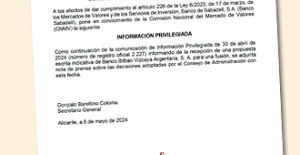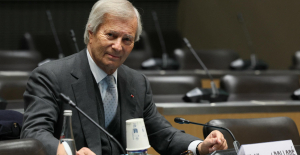School holidays, public holidays: a bill is being examined Tuesday in the Senate to limit strikes in transport over certain periods, a heated debate in perspective three months before the Olympic Games. Necessary measures to “ensure continuity of service”, or “deliberate attacks on the right to strike”? The discussion promises to be heated between the left, fiercely opposed to the text, and the senatorial majority of the right and center, determined to pass it.
“We must sound the alarm” in the face of “excessive and repeated” strikes, underlines the leader of the centrist senators Hervé Marseille, author of this bill tabled in February in the midst of the mobilization of SNCF controllers who had disrupted the vacation departures of at least 150,000 travelers. The text from the head of the UDI, largely expanded last week in committee at the initiative of the right, grants the government a quota of 30 days per year during which “public transport service personnel” would be deprived of their rights strike, with a limit of 7 days in a row per blackout period. These protected days would only concern certain periods: school holidays, public holidays, elections and referendums as well as events of “major importance”. And the ban on striking would be limited only to peak hours and to personnel essential to the operation of the service.
“We are very attached to this fundamental right which is the right to strike, but it is clear that it is today being misused and used in an abusive manner,” says rapporteur Philippe Tabarot (Les Républicains). The latter also proposes to extend the deadline for declaring strikers from 48 to 72 hours, to increase the “minimum level of service” during peak hours with a requisition process under strict conditions, as well as a system for the lapse of certain notices not followed up, to combat “dormant notices” which sometimes last for several months. Another proposal from the senatorial right: require employees wishing to strike to join the movement from the start of their service and not during the day. A way to fight against “59-minute strikes”, less costly for the employee but sources, according to the right, of great disorganization.
This debate was reopened during the February school holidays, in particular by the widely commented declaration of Prime Minister Gabriel Attal, who deplored a "form of habit" to strike during certain periods and affirmed that if "the strike is a right », “working is a duty”. But the government has clarified that it will oppose this text, which risks complicating its inclusion on the agenda of the National Assembly. “There is a problem of constitutionality,” noted Transport Minister Patrice Vergriete on Sud Radio, for whom “prioritizing vacations” amounts to “neglecting everyday mobility.”
The entire left has also planned to oppose this text as a whole, via numerous deletion amendments and other rejection motions. “It’s an epidermal text to wave a red rag before the Olympic Games,” alarms the socialist Olivier Jacquin, burned by the very heated debates that took place in committee last week. He denounces the “considerably violent” remarks of the rapporteur Philippe Tabarot. The latter had accused the left of being “blinded by an ideology which is no longer relevant”. “This text has only one use, it is to blow on the embers on the eve of the Olympics, in the context of tensions that we are experiencing in public transport,” despairs the ecologist Jacques Fernique, regretting that the bill does not rather aim at “the fluidity and quality of social dialogue”.
Although the initial bill included the airline sector, it was ultimately excluded, while two cabin crew unions called a strike on April 15 and 16 to protest against this text, before lifting their notice. In a press release, the CGT transports for its part castigated the “outpouring of populism” of the senatorial majority, accusing it of wanting to “better serve the interests of capital against those of agents and users of the public transport service”.

 Finding yourself face to face with a man or a bear? The debate that shakes up social networks
Finding yourself face to face with a man or a bear? The debate that shakes up social networks Sabadell rejects the merger with BBVA and will fight to remain alone
Sabadell rejects the merger with BBVA and will fight to remain alone In Germany, the far left wants to cap the price of “doner kebabs”
In Germany, the far left wants to cap the price of “doner kebabs” Israel-Hamas war: Gaza between hope of truce and fear of Israeli offensive in the South
Israel-Hamas war: Gaza between hope of truce and fear of Israeli offensive in the South The presence of blood in the urine, a warning sign of bladder cancer
The presence of blood in the urine, a warning sign of bladder cancer A baby whose mother smoked during pregnancy will age more quickly
A baby whose mother smoked during pregnancy will age more quickly The euro zone economy grows in April at its best pace in almost a year but inflationary pressure increases
The euro zone economy grows in April at its best pace in almost a year but inflationary pressure increases Children born thanks to PMA do not have more cancers than others
Children born thanks to PMA do not have more cancers than others “The prices are astronomical”: to enjoy the Olympics with family, Sabrina spent... 8,000 euros
“The prices are astronomical”: to enjoy the Olympics with family, Sabrina spent... 8,000 euros “House of the Dragon”, “Succession”… Max, the new streaming platform from HBO and Discovery, launched in France on June 11
“House of the Dragon”, “Succession”… Max, the new streaming platform from HBO and Discovery, launched in France on June 11 The A13 motorway will finally reopen this Friday, in one direction only
The A13 motorway will finally reopen this Friday, in one direction only TNT commission of inquiry: tensions between LFI deputies and Macronists before the vote on the report
TNT commission of inquiry: tensions between LFI deputies and Macronists before the vote on the report The Coubertin Spirit, Eternal Memory, Planet of the Apes... Films to watch this week
The Coubertin Spirit, Eternal Memory, Planet of the Apes... Films to watch this week Rappers Drake and Kendrick Lamar vie for the spotlight
Rappers Drake and Kendrick Lamar vie for the spotlight In Istanbul, the ancient Byzantine church of Saint-Sauveur-in-Chora reopens for Muslim worship
In Istanbul, the ancient Byzantine church of Saint-Sauveur-in-Chora reopens for Muslim worship David Castello-Lopes: a fresh wind blows on the one-man show with his show Authentique
David Castello-Lopes: a fresh wind blows on the one-man show with his show Authentique Omoda 7, another Chinese car that could be manufactured in Spain
Omoda 7, another Chinese car that could be manufactured in Spain BYD chooses CA Auto Bank as financial partner in Spain
BYD chooses CA Auto Bank as financial partner in Spain Tesla and Baidu sign key agreement to boost development of autonomous driving
Tesla and Baidu sign key agreement to boost development of autonomous driving Skoda Kodiaq 2024: a 'beast' plug-in hybrid SUV
Skoda Kodiaq 2024: a 'beast' plug-in hybrid SUV The home mortgage firm rises 3.8% in February and the average interest moderates to 3.33%
The home mortgage firm rises 3.8% in February and the average interest moderates to 3.33% This is how housing prices have changed in Spain in the last decade
This is how housing prices have changed in Spain in the last decade The home mortgage firm drops 10% in January and interest soars to 3.46%
The home mortgage firm drops 10% in January and interest soars to 3.46% The jewel of the Rocío de Nagüeles urbanization: a dream villa in Marbella
The jewel of the Rocío de Nagüeles urbanization: a dream villa in Marbella Institutions: senators want to restore the accumulation of mandates and put an end to the automatic presence of ex-presidents on the Constitutional Council
Institutions: senators want to restore the accumulation of mandates and put an end to the automatic presence of ex-presidents on the Constitutional Council Europeans: David Lisnard expresses his “essential and vital” support for François-Xavier Bellamy
Europeans: David Lisnard expresses his “essential and vital” support for François-Xavier Bellamy Facing Jordan Bardella, the popularity match turns to Gabriel Attal’s advantage
Facing Jordan Bardella, the popularity match turns to Gabriel Attal’s advantage Europeans: a senior official on the National Rally list
Europeans: a senior official on the National Rally list These French cities that will boycott the World Cup in Qatar
These French cities that will boycott the World Cup in Qatar Ligue 1: at what time and on which channel to watch the Multiplex on Sunday?
Ligue 1: at what time and on which channel to watch the Multiplex on Sunday? PSG-Dortmund: Hummels’ (big) tackle to “teams who wanted to play against” BVB
PSG-Dortmund: Hummels’ (big) tackle to “teams who wanted to play against” BVB Top 14: Pierre Bochaton extends with UBB until 2027
Top 14: Pierre Bochaton extends with UBB until 2027 Tennis: Monfils beaten, Atmane surprises and advances to the 2nd round in Rome
Tennis: Monfils beaten, Atmane surprises and advances to the 2nd round in Rome


















